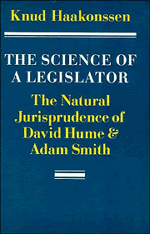Book contents
- Frontmatter
- Contents
- Acknowledgements
- List of abbreviations
- Chapter 1 Introduction
- Chapter 2 Hume's theory of justice
- Chapter 3 Smith's moral theory
- Chapter 4 Smith's theory of justice and politics
- Chapter 5 Smith's analytical jurisprudence
- Chapter 6 Smith's critical jurisprudence
- Chapter 7 Smith's historical jurisprudence
- Chapter 8 Natural jurisprudence in the face of history
- Notes
- Bibliography
- Index
Chapter 5 - Smith's analytical jurisprudence
Published online by Cambridge University Press: 04 April 2011
- Frontmatter
- Contents
- Acknowledgements
- List of abbreviations
- Chapter 1 Introduction
- Chapter 2 Hume's theory of justice
- Chapter 3 Smith's moral theory
- Chapter 4 Smith's theory of justice and politics
- Chapter 5 Smith's analytical jurisprudence
- Chapter 6 Smith's critical jurisprudence
- Chapter 7 Smith's historical jurisprudence
- Chapter 8 Natural jurisprudence in the face of history
- Notes
- Bibliography
- Index
Summary
The legal system
The view of justice as a negative virtue which we have traced in The Theory of Moral Sentiments is obviously that which has traditionally been called commutative justice. Smith is well aware that this is not the only meaning the word has taken in the philosophical tradition, and he is always careful to distinguish it sharply from distributive justice. In the latter sense ‘Justice consists in the proper exercise of all the social and beneficent Virtues’ and it is therefore simply a collective label for all the positive virtues. It is, however, the negative virtue ‘which can alone properly be called Justice’, and which is the basis for all law. Its negative character lends it precision so that it is formulated spontaneously in clear and universal rules, and the primacy of the negative gives it an urgency which with equal spontaneity leads men to attempt to enforce these rules. However, since men are hardly likely to have a clear view of justice in cases where their own interests are involved, ‘civil society would become a scene of bloodshed and disorder, every man revenging himself at his own hand whenever he fancied he was injured’, unless the actual spectators in the social group intervened. As we shall see later, this spectator intervention is one of the original and one of the most important governmental functions, and it is the origin of all law:
The wisdom of every state or commonwealth endeavours, as well as it can, to employ the force of the society to restrain those who are subject to its authority, from hurting or disturbing the happiness of one another. […]
- Type
- Chapter
- Information
- The Science of a LegislatorThe Natural Jurisprudence of David Hume and Adam Smith, pp. 99 - 134Publisher: Cambridge University PressPrint publication year: 1981

